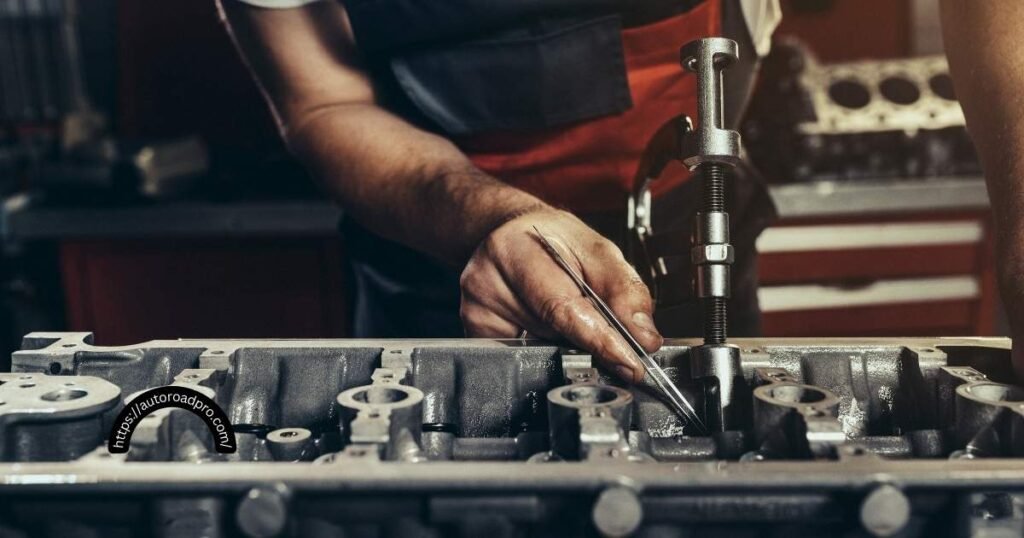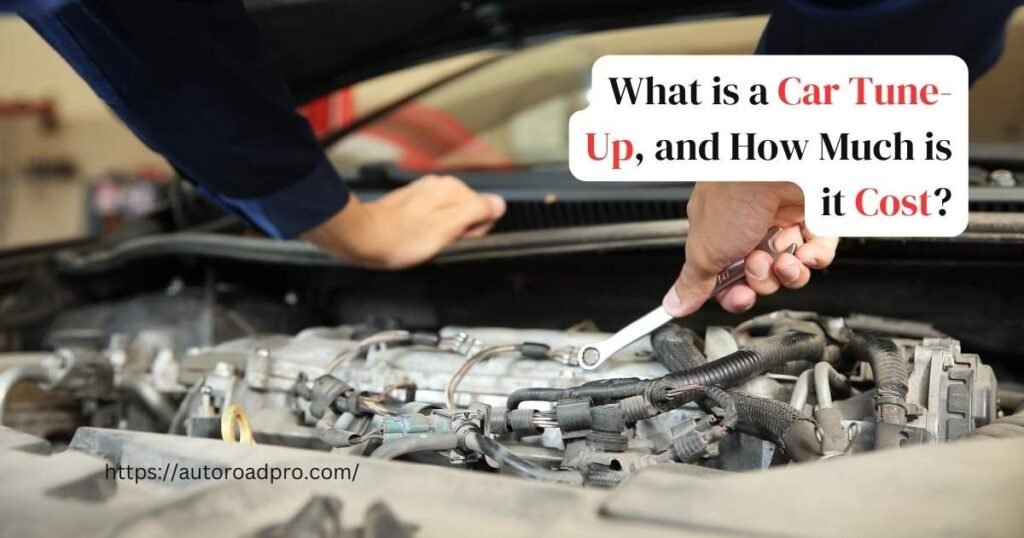A car tune-up helps your vehicle run smoothly and efficiently. During a tune-up, we inspect and replace parts like spark plugs, air filters, and fuel filters. These parts often wear out over time.
Tune-ups are essential. They keep your car from breaking down, help it use less fuel, and make it last longer. If we catch minor problems early during a tune-up, it can save you a lot of time and money. This avoids more significant issues later on.
Table of Contents
How Often Should You Get a Car Tune-Up?
The frequency of car tune-ups varies depending on the make, model, and age of your vehicle. Getting a tune-up every 30,000 to 60,000 miles is a good idea.
However, this can differ. For newer vehicles equipped with advanced technology, tune-ups might be needed less often, sometimes not until 100,000 miles or more. Older models require more frequent tune-ups.
Always check your vehicle’s owner’s manual or talk to a mechanic to find out the best tune-up schedule for your car. This ensures your vehicle runs well and avoids unnecessary repairs.
What are the Average Costs of a Car Tune-Up in 2024?
The cost of a car tune-up can differ quite a bit, depending on several factors. A basic tune-up mainly involves changing spark plugs and can cost you anywhere from $40 to $150.
If you go for a more comprehensive service, the price might be between $200 and $800. As we’re in 2024, the typical cost for a standard tune-up ranges from $150 to $500.
But if you own a luxury or high-performance vehicle, the expenses could climb, ranging from $500 to $1,500.

The final price often depends on your vehicle type, the complexity of the services required, and where you live.
| Service | Average Cost |
| Oil change | $30-$100 |
| Spark plug replacement | $100-$300 |
| Air filter replacement | $20-$50 |
| Fuel injector cleaning | $50-$100 |
| Belt replacements | $50-$200 |
| Labor costs | $100-$300 |
What Factors Influence the Cost of a Car Tune-Up?
The cost of tuning up your car depends on several things. The kind of car you have plays a big role because parts for luxury or special vehicles usually cost more.
The type of work needed can also change the price. For example, it might cost more if you need to replace the timing belt or fuel injectors.
Where you live affects the cost too; city shops often charge more than those in the countryside.
How well you’ve taken care of your car also matters. Cars in good shape generally need fewer repairs, which can save you money.
What are the Signs That Your Car Needs a Tune-Up?
Recognizing the signs that your car needs a tune-up can prevent more severe issues.
Common indicators include decreased fuel efficiency, engine misfires, rough idling, difficulty starting the car, and unusual noises.
If you notice any of these symptoms, schedule a tune-up. Diagnosing and fixing the problems before they get worse is a good idea.
What Services are Typically Included in a Car Tune-Up?
A typical tune-up includes several key services to ensure your car runs smoothly.
Spark plug replacement is crucial as these ignite the fuel-air mixture, and worn-out spark plugs can cause performance issues.
It’s also important to replace the air filter, which ensures optimal airflow to the engine, enhancing performance and fuel efficiency.
During a tune-up, mechanics perform an engine inspection to check for leaks, worn belts, and other potential problems.
They also clean the fuel system to remove deposits that hinder fuel flow and performance and clean the throttle body to improve idle stability and acceleration.
Additional services include:
- Replacing the fuel filters.
- Inspecting the distributor cap and rotor if applicable.
- Checking all fluids are at proper levels.
Some tune-ups also involve inspecting the battery, checking belts and hoses, and performing a diagnostic check to identify any potential issues with the engine.
| Service | Basic Tune-Up | Comprehensive Tune-Up |
| Spark plug replacement | Included | Included |
| Air filter replacement | Included | Included |
| Engine inspection | Basic visual check | More thorough inspection |
| Fuel system cleaning | Optional | May be included |
| Throttle body cleaning | Optional | May be included |
| PCV valve replacement | Not included | May be included |
| Other fluid checks | This may include oil, coolant, and transmission fluid checks | May include oil, coolant, and transmission fluid checks |
How Does the Type of Vehicle Affect the Cost of a Tune-Up?
The type of vehicle you own significantly affects the cost of a tune-up.
Luxury and performance cars often need specialized parts and more labor-intensive procedures, which can increase the cost.
On the other hand, ordinary sedans and compact cars typically have more affordable parts and require less specialized labor.
Hybrid and electric vehicles have unique maintenance needs that can also influence the cost of a tune-up.
What are the Benefits of Regular Car Tune-Ups?
Regular car tune-ups bring several benefits. These include improved fuel efficiency, better engine performance, and a longer vehicle lifespan.
By keeping your car in top condition, you can avoid unexpected breakdowns and costly repairs. Regular maintenance also helps maintain the vehicle’s resale value and ensures it remains safe to drive.
Can You Perform a Car Tune-Up Yourself, and How Much Would It Cost?
Performing a car tune-up yourself is possible if you have the right tools and knowledge.
DIY tune-ups can save you money on labor costs, but you’ll still need to buy the necessary parts.
The cost of these parts can range from $50 to $200, depending on what needs replacing.
However, if you’re not confident in your mechanical skills, it’s best to leave the job to a professional. This avoids potential mistakes that could do more harm than good.
| Part | Average Cost |
| Oil filter | $10-$20 |
| Spark plugs | $50-$100 |
| Air filter | $10-$30 |
| Fuel injector cleaner | $20-$50 |
How Do Labor Costs Vary for Tune-Ups Across Different Regions?
Labor costs for car tune-ups can vary significantly depending on where you live. Urban areas and regions with a high cost of living typically have higher labor rates than rural areas.
For example, a tune-up in New York City might cost significantly more than the same service in a small town in the Midwest.
It’s always a good idea to get quotes from multiple mechanics in your area to ensure you’re getting a fair price.
What are the Most Common Parts Replaced During a Tune-Up?
During a tune-up, several parts are commonly replaced to ensure optimal vehicle performance. These parts include spark plugs, air filters, fuel filters, and ignition wires.
Depending on the vehicle’s age and condition, other components like the distributor cap, rotor, and PCV valve might also need replacement.
Regularly replacing these parts helps maintain engine efficiency and prevents potential issues down the road.
How Do You Choose the Right Mechanic for a Tune-Up?
Choosing the right mechanic for a tune-up is crucial to ensure quality service. Look for a mechanic with certifications from reputable organizations like ASE (Automotive Service Excellence).
Reading reviews and asking for recommendations from friends and family can also help you find a trustworthy professional.
Ensure the mechanic offers a warranty on their work. This provides peace of mind in case any issues arise after the tune-up.
What are Some Ways to Save Money on a Car Tune-Up?
There are several strategies to save money on a car tune-up. Compare prices from different mechanics to find the best deal.
Look for coupons or discounts, which many service centers offer. You can also buy parts yourself and bring them to the mechanic, potentially reducing the overall cost.
Staying on top of regular maintenance can prevent more expensive repairs in the future.
How Does the Frequency of Driving Affect the Need for Tune-Ups?
The frequency and driving you can impact how often your car needs a tune-up.
Vehicles driven frequently or used for short trips may need more regular maintenance than those used less often or primarily for highway driving.
City driving, with its frequent stops and starts, can be more challenging on a vehicle’s engine, requiring more frequent tune-ups to maintain optimal performance.
Are There Any DIY Tune-Up Tips for Car Owners?
For car owners interested in performing a tune-up themselves, there are several tips to keep in mind.
Start by consulting your vehicle’s manual for specific maintenance guidelines. Ensure you have all the necessary tools and parts before beginning the process.
Follow step-by-step guides or tutorials to avoid mistakes. Don’t hesitate to seek help if you’re unsure about any part of the procedure.
Regularly checking and replacing basic components like air filters and spark plugs can keep your car running smoothly.
What is the Difference Between a Basic Tune-Up and a Major Tune-Up?
A basic tune-up typically involves inspecting and replacing essential components like spark plugs, air filters, and fuel filters. It may also include checking fluid levels and performing a diagnostic test.
A major tune-up is more comprehensive. It can involve replacing additional parts like the distributor cap, rotor, and timing belt, as well as a thorough inspection of the entire engine and related systems.
Major tune-ups are generally more expensive due to the increased labor and parts involved.
How Does the Age of Your Car Impact the Tune-Up Cost?
The age of your car can significantly impact the cost of a tune-up. Older vehicles often require more frequent maintenance and may need parts that are harder to find or more expensive.
Additionally, wear and tear on older cars can lead to the need for more extensive repairs during a tune-up.
Conversely, newer vehicles with advanced technology might have longer intervals between tune-ups but could require specialized services that increase the cost.
What are the Potential Risks of Skipping Regular Tune-Ups?
Skipping regular tune-ups can lead to several risks, including decreased fuel efficiency, poor engine performance, and a higher likelihood of breakdowns.
Neglecting maintenance can cause minor issues to escalate into major, costly repairs.
A poorly maintained vehicle can be less safe to drive and might fail emissions tests, resulting in fines or penalties. Regular tune-ups are essential to keep your car running efficiently and reliably.
How Can You Tell If You’re Being Overcharged for a Tune-Up?
To ensure you’re not being overcharged for a tune-up, start by getting multiple quotes from different mechanics.
Compare the prices and services offered to see if there are significant discrepancies. Research the average costs for the specific services you need.
If a mechanic’s quote seems unusually high, don’t hesitate to ask for a detailed breakdown of the charges. Being informed about typical tune-up costs can help you identify and avoid overcharging.
What Should You Ask Your Mechanic Before Getting a Tune-Up?
Before getting a tune-up, ask your mechanic several key questions to ensure you understand the process and costs involved.
Inquire about the specific services included in the tune-up, the estimated cost, and the time required to complete the work.
Ask if there are any potential additional charges and if the mechanic offers a warranty on their services. Understanding these details can help you make an informed decision and avoid unexpected expenses.
How Long Does a Typical Car Tune-Up Take?
The duration of a car tune-up varies by the vehicle’s make, model, and the complexity of the services needed. A basic tune-up usually takes between one to two hours.
However, more extensive work, such as replacing a timing belt or major components, can extend the duration to several hours or a full day.
Always consult your mechanic for an accurate time estimate based on your specific vehicle needs.
What are the Environmental Benefits of Regular Car Tune-Ups?
Regular car tune-ups can have several environmental benefits. A well-maintained engine runs more efficiently, reducing fuel consumption and emissions.
Replacing dirty air filters and spark plugs also contributes to better air quality by lowering the amount of harmful pollutants your car emits.
Keeping your vehicle in good condition helps it operate more cleanly, which is beneficial for both the environment and your wallet.
What are the Best Practices for Maintaining Your Car Between Tune-Ups?
Maintaining your car between tune-ups is essential for optimal performance. Regularly check and top off all fluids, including oil, coolant, and brake fluid. Keep an eye on tire pressure and tread depth to ensure safe driving and better fuel efficiency.
Inspect belts and hoses for signs of wear and replace them as needed. Additionally, cleaning your car’s exterior and interior can help preserve its value and appearance.
How Can You Extend the Life of Your Car with Regular Tune-Ups?
Regular tune-ups can significantly extend the life of your car by ensuring all systems function correctly and efficiently. Addressing minor issues before they become major problems helps you avoid costly repairs and breakdowns.
Keeping up with routine maintenance, such as oil changes, filter replacements, and spark plug inspections, maintains engine health. This regular care boosts overall vehicle performance, leading to a longer lifespan for your car.
What are the Most Reputable Places to Get a Car Tune-Up?
Finding a reputable place for a car tune-up can ensure you receive quality service. National chains like Firestone, Jiffy Lube, and Pep Boys offer standardized services and warranties.
Independent local mechanics can also provide excellent service, often with a more personalized touch.
To find a trustworthy service provider, research online reviews, ask for recommendations from friends and family, and look for certifications like ASE.
How Do Seasonal Changes Affect the Need for a Tune-Up?
Seasonal changes can impact your car’s performance and the need for tune-ups. Extreme temperatures, both hot and cold, can affect engine components, battery life, and fluid levels.
It’s a good idea to get a tune-up before the onset of summer or winter to ensure your car is ready to handle the weather conditions.
Seasonal maintenance can help prevent breakdowns and keep your car running smoothly year-round.
What are the Top Myths About Car Tune-Ups?
Several myths about car tune-ups can lead to misconceptions about their necessity and frequency. One common myth is that modern cars don’t need tune-ups, but even new vehicles require regular maintenance to stay in top condition.
Another myth is that higher-octane fuel improves performance, which is not true for all vehicles. Understanding these myths can help you make better decisions about your car’s maintenance needs.
What Should You Expect After a Car Tune-Up?
After a car tune-up, you should notice several positive changes in your vehicle’s performance. These can include smoother engine operation, improved fuel efficiency, and a reduction in engine misfires or rough idling.
Your car should start more efficiently, and overall, you might experience a more responsive and reliable driving experience.
Keep an eye out for any issues that might arise post-tune-up and address them promptly with your mechanic.
How Do You Prepare Your Car for a Tune-Up?
Preparing your car for a tune-up involves a few simple steps to ensure the process goes smoothly.
Remove any personal items from the vehicle to give the mechanic easy access to all areas. Make a list of any issues you’ve noticed, such as strange noises or performance problems, and share these with the mechanic.
Ensure your car has enough fuel for the mechanic to perform test drives if needed. Preparing can help the tune-up process be more efficient and effective.
What are Some Warning Signs That a Tune-Up Wasn’t Done Correctly?
If your car doesn’t perform as expected after a tune-up, there are several warning signs to watch for.
These can include persistent engine misfires, rough idling, decreased fuel efficiency, and difficulty starting the car.
Unusual noises or vibrations can also indicate that something wasn’t done correctly. If you notice any of these issues, contact your mechanic immediately to have them addressed.
Conclusion
Regular car tune-ups are essential for maintaining your vehicle’s performance, efficiency, and longevity. Understanding the various aspects of a tune-up, from the cost and services involved to the benefits and potential risks, helps you make informed decisions about your car’s maintenance.
Whether you choose to perform a tune-up yourself or seek professional help, staying on top of regular maintenance will keep your car running smoothly and reliably for years to come.


